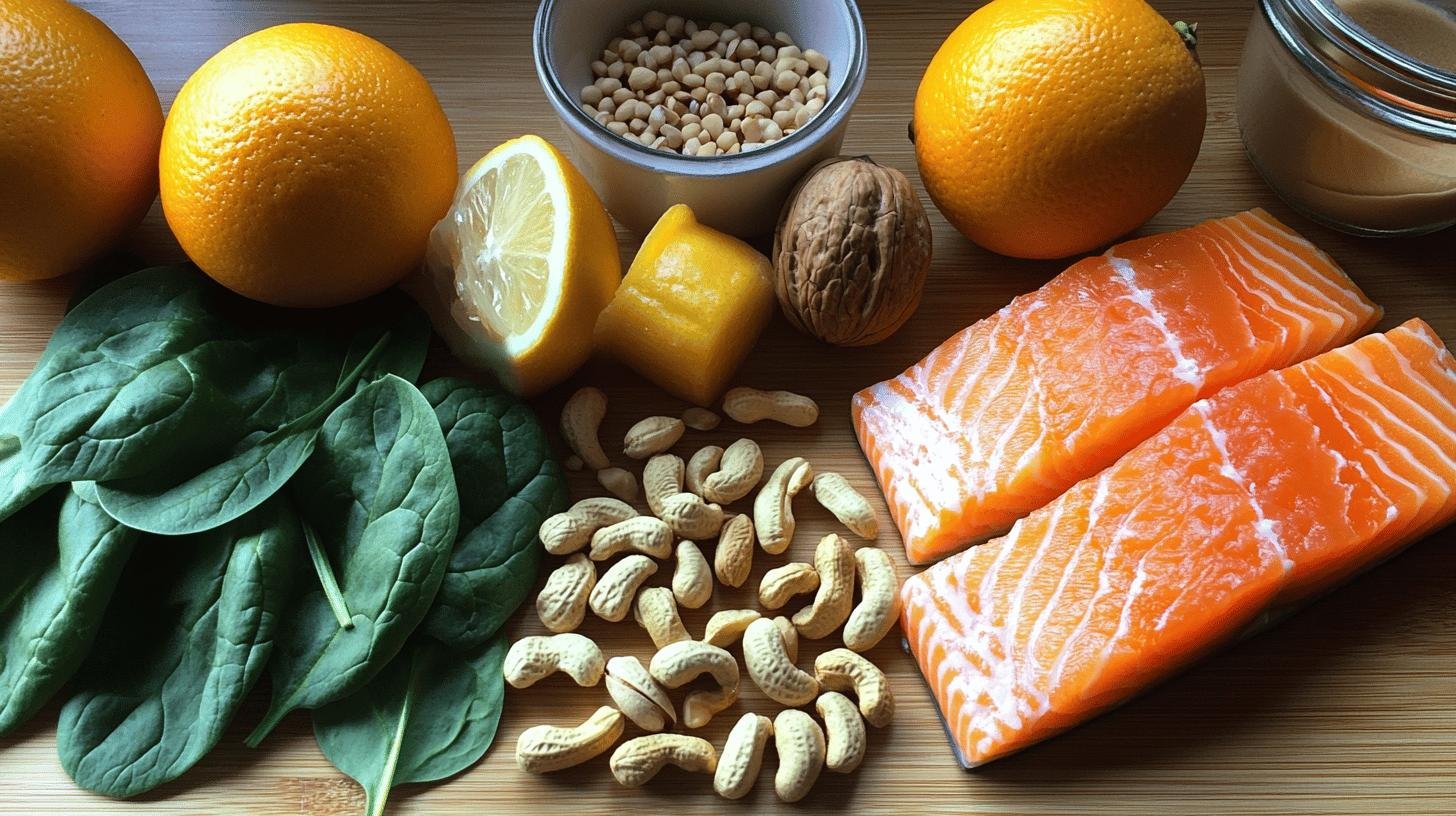TL;DR:
- Nutrition and stress are interconnected; stress affects food choices, and diet influences stress levels.
- Essential nutrients for stress management: Omega-3 fatty acids, Magnesium, Vitamin C, B vitamins, Antioxidants, and Complex carbohydrates.
- Key foods: fish (omega-3s), spinach/almonds/avocados (magnesium), citrus/bell peppers/strawberries (Vitamin C), whole grains (complex carbs).
- A balanced diet includes fruits, vegetables, lean proteins, whole grains, and healthy fats, which lower cortisol and stabilize mood.
- Practical tips: Regular meals, stay hydrated, and limit processed foods.
- Direct primary care offers personalized nutrition and lifestyle strategies to manage stress effectively.
Do you ever feel stress and a poor diet are best friends plotting against your well-being? You’re not alone! Our stress levels and nutrition constantly tango, often leaving us feeling off-balance, which is why we all need revolutionary nutrition and stress management. Are you curious how food can be your ally in this battle? This blog dives into how essential nutrients can help manage stress, improve your health, and elevate your mood. So, grab a cosy seat and let’s chat about turning your pantry into a natural stress-busting aid. Ready to boost your well-being naturally?
The Connection Between Nutrition and Stress Management
Have you noticed how stress affects your food choices? That’s because nutrition and stress share a complex, two-way relationship. Cravings often lean toward comfort foods heavy in sugars and unhealthy fats when stressed. However, the foods you consume can, in turn, affect your stress levels. Eating a nutrient-rich diet can help reduce stress, keeping both your body and mind balanced. In essence, by feeding your body well, you’re better prepared for life’s stressors.
Essential nutrients that help manage stress include:
- Omega-3 fatty acids
- Magnesium
- Vitamin C
- B vitamins
- Antioxidants
- Complex carbohydrates
When stress hits, your eating habits might falter. You could find yourself snacking without thinking or skipping meals. Neither option helps in managing stress. A balanced diet can be your secret weapon. Eating various whole foods—fruits, vegetables, lean proteins, and whole grains—can help stabilize mood swings and enhance overall well-being. So, when stress comes knocking, remember that a balanced plate is your best defence!
Foods and Nutrients That Aid Stress Management

Have you ever wondered why omega-3 fatty acids get so much praise? These are top-notch for reducing anxiety. Found in fish like salmon, sardines, and mackerel, omega-3s work wonders by calming the mind. They’re like a tastier chill pill! Omega-3s ensure your brain functions smoothly, leading to less stress and more zen moments.
Now, consider magnesium, your body’s stress hormone manager. Magnesium is found in spinach, almonds, and avocados and helps regulate stress hormones. When you’re stressed, it keeps those hormones in check, preventing chaos. Including magnesium-rich foods in your diet can significantly improve how your body manages stress.
Vitamin C is another key player in fighting stress. Found in citrus fruits, bell peppers, and strawberries, it strengthens the immune system and lowers stress hormones. Vitamin C helps your body recover quickly after stress, keeping you balanced and less frazzled.
Don’t forget complex carbohydrates, the mood stabilizers of your diet. Whole grains, beans, and lentils maintain steady blood sugar levels, preventing mood swings when stress strikes. They’re like a steady ship in a storm, keeping you calm amid stress.
Crafting a Stress Reduction Diet Plan
Creating a stress-reduction diet is like building a strong defence against stress. The foundation includes a colourful mix of fruits and vegetables, lean proteins like chicken or tofu, whole grains such as brown rice or quinoa, and healthy fats from sources like avocados and nuts. This combination not only fuels your body but also helps lower cortisol, the stress hormone. It’s like equipping your body with tools to handle stress better, supporting brain function, and stabilizing mood swings.
| Meal | Foods Included |
|—————|———————————————-|
| Breakfast | Oatmeal with berries and a sprinkle of nuts |
| Lunch | Grilled chicken salad with mixed greens |
| Dinner | Quinoa with roasted vegetables and tofu |
Sticking to regular meal times is as crucial as what you eat. Your body, like a car, needs consistent fuel to run smoothly. Skipping meals can cause sudden blood sugar drops, increasing stress and irritability. And let’s not forget hydration! Water is your best friend on this journey. Staying hydrated fends off fatigue and maintains energy levels, making stress more manageable. So keep your water bottle close and hydrate frequently!
Practical Tips for Managing Stress Through Nutrition

Skipping meals or failing to drink enough water can affect your mood. Meal regularity and hydration are crucial for managing stress. A consistent meal schedule maintains blood sugar levels, helping keep stress away. Think of your body as a clock that runs smoothly when fed regularly. As for hydration, water is your stress-fighting ally. Dehydration can cause fatigue and irritability, increasing stress. Keeping a water bottle handy is a simple yet effective stress management technique.
Now, here are some practical tips:
- Include a variety of fruits and vegetables
- Maintain regular meal times
- Stay hydrated
- Incorporate whole grains and lean proteins
- Limit processed foods and sugars
These strategies aren’t just about filling your plate but about enhancing mental health. By consistently choosing stress-reducing foods, you supply your body with the nutrients it needs to combat stress naturally. This approach aids in alleviating nutrition-associated anxiety and supports well-being overall. Whole-diet interventions like these improve mental health outcomes. So next time you plan your meals, think of it as crafting your daily stress-busting toolkit!
The Role of Direct Primary Care in Stress Management
Have you ever wished for a more personalized healthcare model? Direct primary care (DPC) offers that personal touch. It eliminates insurance hassles, allowing doctors to focus more on you than on paperwork. DPC doctors provide tailored nutritional advice suited to your needs—it’s like having a nutritionist in your pocket. DPC doctors craft plans that help manage stress with food choices that fit your lifestyle.
So, how does this assist with stress management? DPC is about more than just diet. It’s about shaping your entire lifestyle to fit you. Doctors in this model delve into your habits and stressors, providing personalized tips and strategies. Imagine having a stress-management plan designed just for you, covering everything from meal planning to relaxation techniques. It’s healthcare that truly cares about your well-being.
Final Words
Exploring nutrition and stress management sheds light on their intertwined dance. We dove into how essential nutrients like Omega-3s and B vitamins can lower stress levels. Foods rich in these nutrients help manage stress and enhance mental and physical wellness.
Crafting a diet plan with these goodies can smooth out life’s bumps. Regular meals, hydration, and smart food choices keep stress at bay.
Direct primary care can provide personalized advice. Combining nutrition and healthcare leads to a healthier, happier you.
FAQ
What is nutrition and stress management?
Nutrition and stress management refers to how our diet can impact our stress levels and vice versa. Eating the right nutrients can help balance stress, improve mental health, and boost overall well-being.
How does diet reduce stress?
Diet reduces stress by providing essential nutrients like B vitamins, Omega-3s, and magnesium. These support brain function and regulate stress hormones, helping keep you calm and balanced.
What are the 4 A’s of stress management?
The 4 A’s of stress management are Avoid (stressors), Alter (your reactions), Accept (what you can’t change), and Adapt (to stress). These strategies help you handle stressful situations more effectively.
What nutrient reduces stress?
Magnesium is a nutrient known to reduce stress. It helps regulate stress hormones and is found in foods like spinach, nuts, and seeds. Incorporating it into your diet can promote relaxation.
What foods reduce stress hormones?
Fatty fish (Omega-3s), nuts (magnesium), citrus fruits (Vitamin C), whole grains, avocados, and leafy greens are foods that reduce stress hormones. They help manage stress levels naturally and effectively.
How does nutrition impact stress?
Nutrition impacts stress by influencing hormone levels and energy balance. Eating nutrient-rich foods supports mental health, and poor dietary choices can increase stress, mood swings, and fatigue.
What are nutritional stress examples?
Nutritional stress examples include consuming too much caffeine, relying on processed foods, or skipping meals. These habits can elevate stress hormone levels and negatively affect mental well-being.
What is a diet for stress and anxiety?
A diet for stress and anxiety includes vitamins B and D, Omega-3 fatty acids, and antioxidants. To balance mood and reduce stress, focus on fruits, vegetables, whole grains, and lean proteins.

